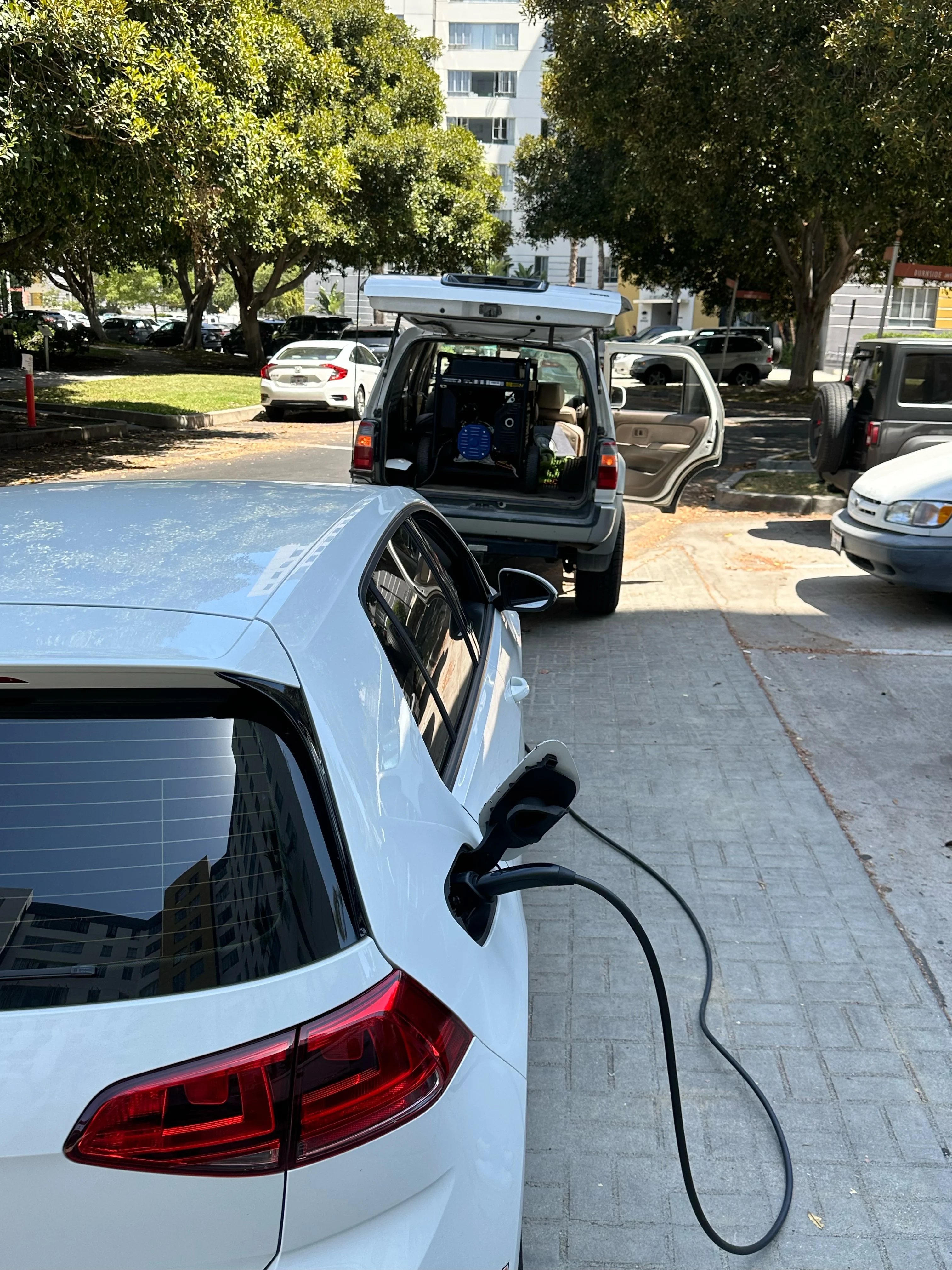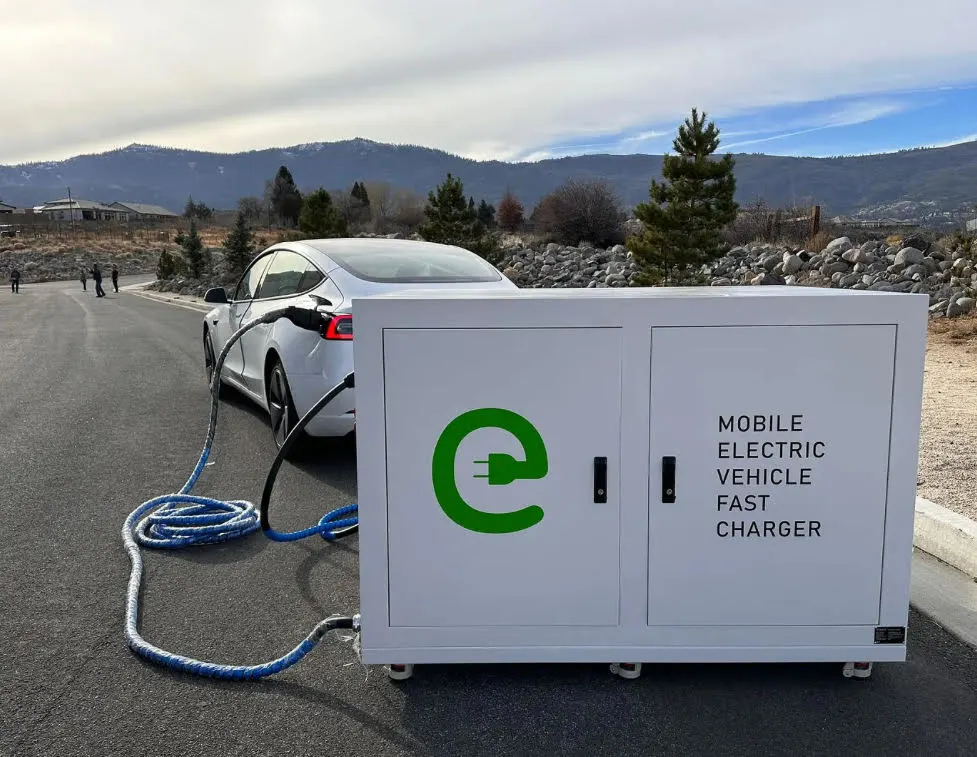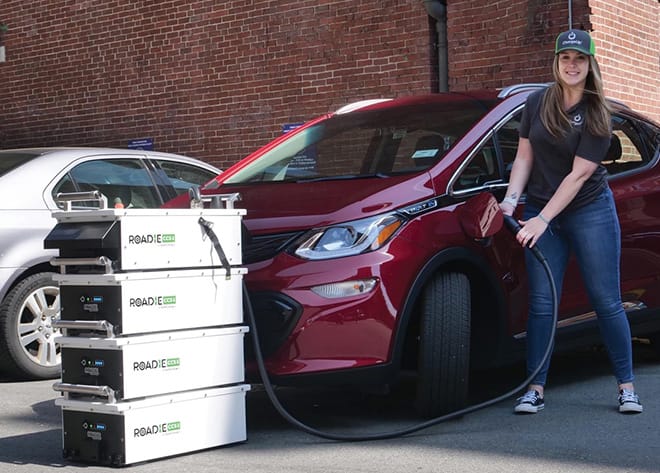As the world continues to shift towards sustainabletransportation, electric vehicles (EVs) have become increasingly popular.However, one of the main challenges EV owners face is finding convenient andaccessible charging stations. This is where mobile charging solutions come in,revolutionizing the way we charge our EVs.
In this article, we will explore the future of EVmobile charging and how it is set to transform the way we power our electricvehicles. From portable charging stations to on-demand charging services,technology is paving the way for a more accessible and efficient charginginfrastructure.
With the keywords “revolutionizing” and”future of EV mobile charging,” we will delve into the latestadvancements in this field. We will discuss the benefits of mobile chargingsolutions and how they can address the limitations of traditional charginginfrastructure.
It’s an exciting time for EV owners and enthusiasts,as mobile charging solutions offer the flexibility and convenience needed tofully embrace electric vehicles. Join us as we explore the future of EV mobilecharging and its potential to accelerate the transition to a more sustainablefuture.

Advantages of EV mobile charging
The rise of electric vehicles (EVs) has brought abouta significant shift in the way we think about transportation and energyconsumption. As the world becomes increasingly conscious of the need forsustainable solutions, mobile charging has emerged as a game-changer in the EVlandscape. One of the primary advantages of EV mobile charging is the increasedaccessibility and convenience it provides to EV owners.
With traditional charging infrastructure oftenlimited to specific locations, such as dedicated charging stations or homegarages, EV owners have faced challenges in finding convenient chargingoptions, especially during longer journeys or when away from their primarycharging sources. Mobile charging solutions address this issue by bringing thecharging capability directly to the EV, allowing users to charge their vehicleswherever they are, whenever they need to.
Another key advantage of EV mobile charging is itsability to cater to the diverse needs of EV owners. Whether it’s the need for aquick top-up charge during a busy day or a more comprehensive charging session,mobile charging solutions can be tailored to meet the specific requirements ofeach user. This flexibility ensures that EV owners can maintain the range andperformance of their vehicles, reducing the anxiety associated with batterydepletion and range limitations.

Challenges and limitations of EV mobile charging
While the advantages of EV mobile charging arenumerous, there are also challenges and limitations that need to be addressed.One of the primary concerns is the availability and reliability of mobilecharging services. Ensuring a widespread and consistent network of mobilecharging options is crucial for EV owners to have confidence in their abilityto charge their vehicles on the go.
Another challenge lies in the technical aspects ofmobile charging. The power output and charging speeds of mobile chargingsolutions need to be sufficient to meet the demands of modern EVs, which oftenrequire high-powered charging to replenish their batteries quickly. Balancingthe portability and convenience of mobile charging with the necessary powerdelivery can be a delicate engineering challenge.
Additionally, the cost of mobile charging services isan important consideration for EV owners. While the convenience and flexibilityof mobile charging may be appealing, the pricing structure needs to becompetitive and accessible to ensure widespread adoption. Striking the rightbalance between the cost and the value provided by mobile charging solutions iscrucial for their long-term sustainability.

Current trends in EV mobile charging technology
As the demand for EV mobile charging continues togrow, the industry has witnessed a surge of technological advancements aimed atimproving the overall experience. One of the key trends is the development ofmore powerful and compact mobile charging units, capable of delivering highercharging speeds and increased battery capacities.
Manufacturers are also exploring the integration ofrenewable energy sources, such as solar panels, into mobile charging solutions,allowing for self-sustaining and environmentally-friendly charging options.This not only enhances the sustainability of the charging process but alsoexpands the availability of mobile charging services in areas with limitedaccess to traditional power grids.
Another trend in the EV mobile charging landscape isthe emergence of intelligent and connected charging solutions. These advancedsystems leverage the power of IoT (Internet of Things) and cloud-basedtechnologies to provide real-time information, remote monitoring, and evenpredictive maintenance capabilities. This integration of smart featuresempowers EV owners with greater control, transparency, and reliability in theirmobile charging experiences.
Emerging technologies in EV mobile charging
As the EV industry continues to evolve, the future ofmobile charging is being shaped by a range of emerging technologies thatpromise to revolutionize the way we power our electric vehicles. One suchinnovation is the development of wireless charging solutions, which eliminatethe need for physical charging cables and provide a more seamless andconvenient charging experience.
Wireless charging technology utilizes electromagneticinduction to transfer energy from a charging pad to the vehicle’s battery,allowing EV owners to simply park their cars over the charging pad and initiatethe charging process without any manual intervention. This not only enhancesthe user experience but also opens up new possibilities for autonomous andsemi-autonomous charging solutions, where vehicles can self-park and chargewithout the need for human interaction.
Another emerging technology in the EV mobile chargingspace is the integration of energy storage systems, such as portable batterypacks or even vehicle-to-grid (V2G) capabilities. These solutions enable EVowners to store excess energy from their vehicles and utilize it for mobilecharging, effectively turning their cars into mobile power sources. This bidirectionalenergy flow can help optimize the utilization of renewable energy sources andprovide greater flexibility in charging scenarios.
Future possibilities for EV mobile charging
As the EV market continues to evolve, the future ofmobile charging holds immense potential for transforming the way we power ourelectric vehicles. One of the most exciting possibilities is the integration ofautonomous and robotic charging solutions, where self-driving charging unitscan locate and charge EVs without the need for human intervention.
These autonomous charging systems could be deployedin strategic locations, such as parking lots or urban centers, to provideon-demand charging services to EV owners. By leveraging advanced sensors, AI,and robotic technologies, these charging units can navigate to the correctvehicle, initiate the charging process, and even handle payment transactions,creating a seamless and hassle-free charging experience for users.
Another intriguing future possibility is theintegration of mobile charging solutions with smart city infrastructure. Ascities continue to invest in sustainable mobility initiatives, the integrationof EV charging capabilities into urban planning and infrastructure can create amore holistic and efficient charging ecosystem. This could include thedeployment of mobile charging hubs, where EV owners can access a network ofcharging options strategically placed throughout the city, reducing rangeanxiety and promoting the widespread adoption of electric vehicles.

Impact of EV mobile charging on the electric vehicle industry
The rise of EV mobile charging solutions is poised tohave a significant impact on the electric vehicle industry, driving forward thetransition towards a more sustainable and accessible transportation future. Oneof the most notable impacts is the potential to address the range anxiety thathas been a persistent concern for many EV owners.
By providing convenient and accessible chargingoptions, mobile charging solutions can alleviate the fear of running out ofbattery during a journey, encouraging more consumers to consider the switch toelectric vehicles. This increased confidence and accessibility can lead to asurge in EV adoption, as consumers become more comfortable with the idea ofowning and operating an electric vehicle.
Moreover, the impact of EV mobile charging extendsbeyond just the end-user experience. The integration of mobile chargingsolutions into the broader EV ecosystem can also benefit the industry as awhole. For instance, the data collected from mobile charging sessions canprovide valuable insights into usage patterns, charging behavior, andinfrastructure needs, allowing automakers, charging providers, and policymakersto make more informed decisions and tailor their offerings to better meet theevolving needs of EV owners.
Government initiatives and policies supporting EV mobile charging
As the world becomes increasingly focused onaddressing climate change and promoting sustainable transportation, governmentsaround the globe have recognized the critical role that EV mobile charging canplay in accelerating the adoption of electric vehicles. Many countries andregions have implemented various initiatives and policies to support thedevelopment and deployment of mobile charging solutions.
One such example is the European Union’s commitmentto investing in the expansion of EV charging infrastructure, including mobilecharging options. Through programs like the Alternative Fuels InfrastructureDirective and the Connecting Europe Facility, the EU is providing funding andregulatory frameworks to encourage the deployment of mobile charging stationsacross member states, ensuring a more comprehensive and accessible chargingnetwork for EV owners.
In the United States, the Biden administration hasalso made significant strides in supporting the growth of EV mobile charging.The recently passed Bipartisan Infrastructure Law allocates billions of dollarsin funding for the construction of a nationwide network of electric vehiclecharging stations, with a specific focus on addressing the needs of rural andunderserved communities. This investment is expected to spur the developmentand deployment of innovative mobile charging solutions that can reach theseareas and provide equitable access to EV charging.
Key players in the EV mobile charging market
As the demand for EV mobile charging solutionscontinues to rise, a diverse array of companies and organizations have emergedas key players in shaping the future of this industry. From establishedautomotive manufacturers to innovative startups, these entities are driving thetechnological advancements and market expansion that will define the EV mobilecharging landscape.
One prominent player in the EV mobile charging marketis Tesla, the pioneering electric vehicle company. Tesla has not only developedits own network of Supercharger stations but has also introduced mobilecharging solutions, such as the Tesla Mobile Connector, which allows EV ownersto charge their vehicles from a standard household outlet. This integration ofmobile charging capabilities into the Tesla ecosystem has been a significantfactor in the company’s success and the overall adoption of electric vehicles.
Another key player in the EV mobile charging marketis ChargePoint, a leading provider of electric vehicle charging solutions.ChargePoint has developed a range of mobile charging options, including theChargePoint Express Plus, which offers high-power charging capabilities forcommercial and fleet applications. The company’s focus on delivering innovativeand user-friendly mobile charging solutions has positioned it as a prominentplayer in the industry.
Conclusion: The future of EV mobile charging
As the world continues to embrace the transitiontowards sustainable transportation, the future of EV mobile charging holdsimmense promise. The advancements in technology, the commitment of governmentsand policymakers, and the innovative efforts of industry leaders all point to afuture where charging an electric vehicle will be as seamless and accessible asrefueling a traditional gasoline-powered car.
The integration of emerging technologies, such aswireless charging, autonomous charging systems, and smart city infrastructure,will pave the way for a more convenient and efficient EV charging experience.Mobile charging solutions will become increasingly integrated into the broaderEV ecosystem, providing valuable data and insights that will drive furtheradvancements and better-tailored offerings for EV owners.
Moreover, the continued support and investment fromgovernments and policymakers will play a crucial role in ensuring thewidespread deployment and accessibility of mobile charging options,particularly in underserved and rural areas. This will help to create a more equitableand inclusive transition to electric mobility, empowering all individuals toembrace the benefits of sustainable transportation.
As we look towards the future, the potential of EVmobile charging is truly exciting. By revolutionizing the way we charge ourelectric vehicles, we are not only addressing the practical challenges of rangeand accessibility but also accelerating the transition towards a cleaner, moresustainable, and more connected transportation future. The journey ahead isfilled with innovation, collaboration, and a shared vision for a greenertomorrow.

